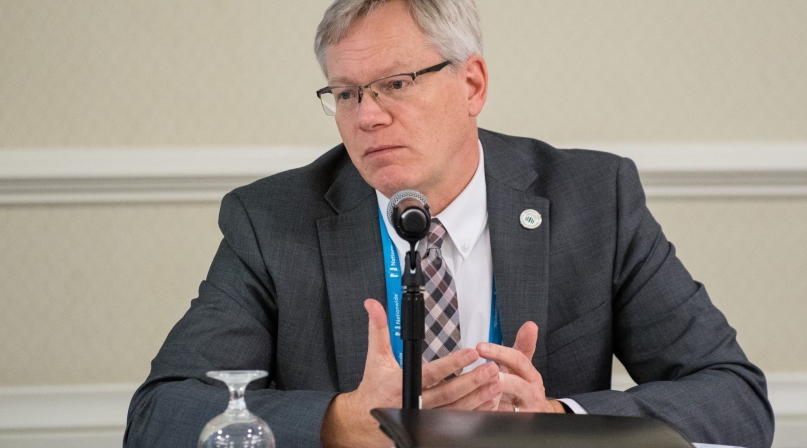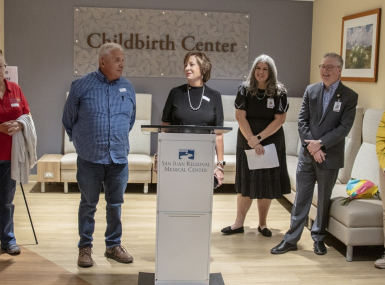Washington exec Johnson exits ‘stage West’ after 17 years

Key Takeaways
Eric Johnson has lived his entire life in Western Washington, but the “Cascade Curtain” never stopped him from being an advocate for counties on either side of the mountain range.
For 17 years, he served as executive director of the Washington State Association of Counties, never showing favoritism toward the coast. When he left at the end of May, he left knowing he was a champion of counties statewide.
“He was very good at getting a lot of different counties to work together on issues,” said Wes McCart, a commissioner from Stevens County in the state’s northeast, opposite Lewis County in the southeast, where Johnson served as a commissioner in the early 2000s, following positions with the state and 16 years in Lewis County’s parks and recreation department.
When Johnson came to the state association in 2005 after a term and a half in Lewis County, he walked away from elected office.
“I was not going to be a career elected official, it just wasn’t who I was,” he said. “I wanted to return to administration and [the state association] was a perfect balance between statewide policy and organization and still being connected to local government.”
He leaned on both roles in Lewis County to help inform his relationships with members and to guide his work at the state association.
“As an elected official, there is a sense of urgency because you only have one term [at a time] and that’s all you’re guaranteed, so there’s a sense of urgency to accomplish and to achieve your goals to achieve the outcomes you set out to pursue,” he said. “And while elected officials are very, very important in our process, it is the county staff that ultimately, oftentimes are the ones that get the work done.”
That motivated Johnson’s efforts to coordinate with different affiliates as a tenet of his leadership of the organization.
“His work with the affiliates multiplied the work we did,” said WSAC President Lisa Janicki, a Skagit County commissioner. “He found ways to make connections that made a lot of sense for the organization, not just to say we’re working with other groups, for show. If it made sense for counties, he was for it.”
Janicki said many of her peers described Johnson as having a Switzerland-like neutrality when it came to mediating conflicts and political disagreements.
“He’s really smart and he’s really professional,” she said. “You’d never hear a bad word from him about anything or anybody,” among WSAC membership.
Her predecessor as WSAC president, Mary Kuney, echoed that sentiment.
“He often took a facilitator’s approach,” she said. Kuney is a Spokane County commissioner. “He was always mindful to never be too heavy handed and let the members drive the organization, but always equipped us with the best information and the best advice to make decisions.”
Past WSAC President Michael Largent, a Whitman County commissioner, said Johnson was unfailingly graceful across political divides.
“He had little patience for unnecessary partisanship and inflammatory comments,” Largent said. “He was always respectful of the opposition and he encouraged the rest of us to be respectful of people we disagreed with as well.
“The hot button issues that divide people so emotionally, don’t usually affect counties, so we were able to stay focused on providing services to our residents and working on our shared priorities.”
Kuney added that Johnson was eager to orient county officials to the organization and mentor newly elected commissioners. His easy demeanor made him a valued counselor.
“If you called him and you were upset about something, he’d calm you down and help you think about things rationally and realistically and guide you to what you’d need to do to resolve the problem,” she said.
He has remained close with peers at other Pacific Northwest state associations and found counsel with several as they all faced the burdens of indigent defense costs in their states.
The only disadvantage Johnson saw with his career path was that by backing off of having a hand in human services while on the Lewis County commission — it was his colleague’s bailiwick — he didn’t have the same firsthand experience facing community-wide behavioral health and substance use issues as a county commissioner that his members would have.
While Johnson seized on the state’s legislative process, he felt he grew by expanding WSAC’s outreach between sessions, which helped counties assuage the losses from turnover in both elected officials and legislative staff. Now the state will see a significant amount of county-related turnover. In the year since Johnson announced his plans, two vocal advocates for county government, Derek Kilmer (D) and Cathy McMorris Rodgers (R) declined to run for reelection to the U.S. House.
Janicki finds herself happy for Johnson but jealous of his newfound free time.
“I’m excited he’s able to enjoy time with his grandchildren and do some of the travel he never got to do unless it was part of a conference,” she said.
Johnson enjoyed seeing all corners of his state in the process, and Largent, who traveled with him frequently, noted Johnson’s mental travel guide that could guide the pair to the best burgers, farmers markets, clams, buffets and more across the state.
“Traveling with him was a series of 12,000-calorie days,” Largent joked.
Despite traveling all over the state, there’s one place Johnson had yet to visit: The Juniper Dunes wilderness in Franklin County.
“It’s a remote region that you really have to want to go to if you’re going to find it,” he said.
Related News

Now I know I can adapt my communication style
San Juan County, N.M. Commissioner Terri Fortner spent her career working with people one-on-one, but she overcame hangups about online communication when the pandemic forced her onto video calls when she first took office.

County service meets a veteran’s need for purpose in Spotsylvania County, Virginia
After Drew Mullins transitioned from a high-performance lifestyle in the military, he found the environment and purpose he sought when he took office in his county.
Now I know that solid waste is complicated
Custer County, Idaho Commissioner Will Naillon says solid waste removal is "one of the things that people often take for granted until it’s their job to make sure it happens... that’s the story of being a county commissioner."
County News
Changing 50 years of Washington state criminal records proves less than simple

